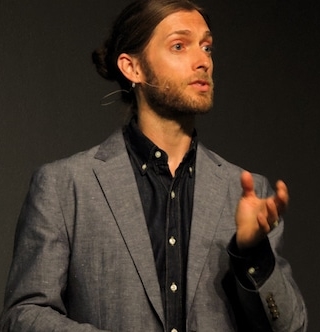The Philosopher-for-Hire Who Says Meaningful Work Is an Illusion

Over the last decade, Andrew Taggart has made a name for himself. Outlets like Quartz and Big Think have described him as a gadfly-for-hire, a practical philosopher who offers his conversational and philosophical acumen to the likes of Silicon Valley venture capitalists and entrepreneurs, among others. He told The Guardian that he has executives question whether the existence of their company, or its products, is “actually justified.” Taggart admits the term practical philosopher is redundant. Philosophy, or the love of wisdom, is inherently about action—about what to do, and how. He claims to be a philosopher in the “true sense,” someone concerned with asking and seeking to answer basic questions—about the self, about reality, about the good life—not merely as an intellectual exercise or pursuit, but as a mode of living. It’s not enough to answer these questions in words, in other words. “The ultimate answer to these ultimate questions,” Taggart wrote to me, in an email, “is how one actually lives” (emphasis his).
Much of life now, for better or worse, is work—in the sense that it is often toilsome and dictated by an employer. Many of us would like to believe that, despite this, holding a meaningful job is not only possible but reasonable. I for instance believe myself fortunate to be spending much of my time, as an editor and writer at a science and culturemagazine, pursuing my intellectual curiosity. I find that meaningful.
But Taggart, as I learned in my conversation with him, sees things differently. Even for someone like Elon Musk, meaningful work is a logical impossibility. This is the sort of thing Taggart discusses with his “conversation partners,” or those who have experienced what he calls an “existential opening.” By his count he’s put over 20,000 hours into probing all kinds of people—from Sufi mystics to secular humanists, from those who could barely eke out a living to those who were quite well off, from the young to the old, from Scandinavians to South Americans, from those on Wall Street to those in Silicon Valley—with sensitive, artful questions that get them to reflect on their goals, daily habits, and the course of their lives. “When individuals are opened up in this existential sense,” Taggart said, “they start to bend philosophical questions they ask back on themselves because they understand, just now, that they are implicated in whatever it is that they truly seek.”
Part of Taggart’s missions seems to be to break a certain spell—that living a successful, meaningful life should be conceived as a kind of work. You’ve heard this before: to be a better person—a better coworker, partner, parent, or sibling—requires “work on oneself.” This is the wrong way to think about the most important parts of our lives, Taggart argues. To get us on the right track, he’s been raising awareness, in lectures among other things, about “Total Work,” the idea that today’s society shapes us not into reflective and civic-minded citizens but into Workers, people who live to be productive. Taggart’s responses can sound quixotic but they’re sincere, and worth hearing out.
I began by asking Taggart why it is that people seek his counsel.
You say that many people who wish to philosophize with you are “estranged professionals.” What are the sorts of problems they typically face, and how do you tend to address them?
I would put the matter this way. Let’s say that it’s 2017, or sometime after that, since it was around this time that Silicon Valley “discovered” that I philosophize with technologists, founders, and executives. Since that time, a fair number of people with whom I’ve regularly conversed have come to the dawning and, for them, dramatic realization that they’ve done everything “right” and yet they’re, for reasons they know not, unhappy. They’ve worked hard, they’re now successful, they’ve accrued wealth and status, they have a charming family, and yet something in them is mysteriously off. Something remains unsatisfied or, as Hamlet once said, “out of joint.” How could it be that they’ve lived what they were told was the happy life at the same time that they know that something deep and seemingly unfathomable remains unasked and unconsidered? This is beyond puzzling.
Do you show these “estranged professionals” how philosophy can solve existential problems?
Not quite. In my understanding, philosophia—the loving pursuit of living a wise life—is not concerned with problems at all. There is a considerable difference between (a) problems and solutions and (b) true questions and answers. Philosophia begins with questions that range widely. Here are some questions conversation partners and I ask together:
- What is the fear of death? Why am I afraid of my own death?
- What is love? How do I know whether I love this person or not? (And how would I know whether I’d wish to devote myself to this person or not?)
- Why is nihilism so prevalent, and why is it that I in particular am in the throes of nihilism?
- How do I know myself? And what is this “myself” whom I wish to know?
You don’t find those questions to be too academic, or abstract?
They are not. Whenever an experience in life is so strong as to be “convulsive,” any of these questions may come to stare us in the face. And usually a seemingly ordinary affair ends up, through philosophical inquiry, to illuminate much, much more. There is no way of answering how philosophy addresses these matters of ultimate concern. That only becomes clear in and through the activity itself and, in this respect, it’s like poetry: There’s no way to paraphrase. For the more we philosophize, the more life becomes intelligible; the more life becomes intelligible, the more it makes sense and, indeed, is imbued with a kind of vibrancy, levity, and crackle. How exactly this happens is a mystery, but then so, properly understood, is life itself.
Is your critique of work, or our society’s state of Total Work, tantamount to a criticism of capitalism?
No. Total Work I define as the long historical process by which human beings were transformed into Workers and nothing else as more and more aspects of life were transformed into work. (For a very brief talk on the subject, see here.) Properly understood, Total Work is like a Geist, a spirit or life force coursing through history. (If we admit that evolution is a process following a certain inexorable logic, then we shouldn’t yet rule out the possibility that Total Work could also be an abstract process unfolding according to its own logic.)
Total Work predates the birth of capitalism, yet Total Work does “seed itself” in capitalism, which is its present carrier. Yet Total Work is, as it were, also promiscuous. The USSR and the Weimar Republic both had their own idolizations of the Worker. Yet while state socialist and fascist systems both collapsed, the liberal democratic-market capitalist (or, in Scandinavia, social democratic-market capitalist) duo lived on. In this form, Total Work has become more and more ubiquitous.
I don’t think that Total Work really cares all that much about which system it invades just so long as it’s able to spread as far and wide as it can. Its spirit is colonial or, given our collective predicament just now, viral. While it has no soul or telos, it does enjoy vanity: It likes seeing itself fully realized in every quadrant of the world.
You mentioned people’s “existential openings”—might there be a collective existential opening about work during this pandemic?
Perhaps. The COVID-19 pandemic has very quickly revealed to us that the emperor has no clothes. For the longest time, it seemed as if work could masquerade, as it has, as an ultimate human concern when, in truth, such has never been anything but ideology. The tragic fact that many people are losing their livelihoods has meant that they have become acutely aware that work has always, at its heart, been centered on livelihoods and not on hifalutin matters like “purpose,” “meaning,” “social impact,” and so on. To suggest otherwise, as modern culture has, is brazen insanity.
On Twitter, for example, I hear few people talking about nonsense about work. Instead, old, thick, and beautiful words are returning with new force, words like care, compassion, love, and wisdom. People are not—or are not so—worried about their optics on LinkedIn or about creative class circuses. Finally, some are starting to get real and be real, and for me, this change in the collective mood is refreshing and moving and sweet.
How do you understand work and leisure—as two sides of the same coin?
It will be very difficult to answer this question just because our modern ears can scarcely hear what genuine leisure is. What I would say instead is that leisure, in the right culture, is primary whereas non-leisure is secondary, for it is in genuine leisure that contemplation is possible.
A good guide here is the late German philosopher Josef Pieper. In Leisure: The Basis of Culture, Pieper demonstrates that the work/non-work dyad evident in modernity bears no resemblance to premodern understandings of leisure/non-leisure. Here is a chart that summarizes Pieper’s argument as I see it:
Notice how, in the medieval period, leisure is the positive term meaning a basic agreement within one’s soul whereas non-leisure could be said to be what arises from a fundamental disagreement with oneself and Reality. Non-leisure is a kind of agitation or irritation of one’s spirit. Said differently, genuine leisure is what enables us to open ourselves up to Reality in hopes of apprehending it; while non-leisure, provided that it eclipses leisure, is the veiling of this openness to what really is. Worse, non-leisure is a means by which we flee what we do not understand and are existentially terrified by.
What Pieper is tracking, then, is how this genuine understanding of leisure has not only been lost but, having been lost, forgotten. It is forgotten by virtue of being hidden in plain sight: We use the same word as medievalists did, yet in modern culture it has been emptied of meaning. For us, it is just “down time,” “spare time,” “free time,” and all of these ain’t what genuine leisure is.
What’s the cost of misunderstanding what leisure really is?
Basically, that we’ve gotten almost everything wrong. While we erroneously believe that work is the modus operandi of being human (think of Marx’s axioms here) and hence that non-work is a deviation from man’s “species-being,” every reasonable, and poetic, metaphysic hitherto, beginning with Being or Stillness, has witnessed proper activity arise out of the sheer fecundity of Being. In other words, the true essence of our being is meditation. Meditation is intimacy with Being.
How is meaningful work a logical impossibility?
Meaning, it’s important to see, means being in touch with a greater reality. (For now, I beg off speaking about plausible candidates for “greater reality.”) Given this definition, meaning is not something you can do. This is because meaning is what you essentially are. It’s enough to understand one’s true nature in order for one’s life to be meaningful. Period. In fact, if one understands one’s true nature, then the question of meaning does not arise for there would be no agitation, no impulse, no need. And it will never be enough, not even for Elon Musk, to accomplish whatever it is he accomplishes during this lifetime. His contributions may be important, yet it does not follow that his existence is a meaningful one. Usefulness is not, and cannot be, meaning.
But plenty of people report that they have meaningful careers.
Sure. But I would say that, if you ask someone who has only ever lived in and known a barren landscape what she thinks of said landscape, her reply would likely be that it’s “good enough.” I ask you to consider whether, like her, we’ve been living in the ruins of a culture without even knowing it. If this is so, then no sociological studies or polls will amount to anything but opinions on barren landscapes.
What is your goal in giving talks like the one you gave at the Institute for Human & Machine Cognition, where you describe the shifting meaning of “work”—from “mere toil,” to something virtuous or character-building, and to finally a vocation or calling?
The most straightforward goal in talks like the one I gave is to reveal to us the folly we have fallen into and, realizing this, for us to be that much wiser. A long history may help us divest ourselves of a longstanding illusion. Realize that before the birth of modernity, work was regarded as one of the lowliest human concerns. You don’t create a chattel slave society (which, as the late Moses Finley argued, isn’t the most efficient system from a strictly economic point of view and which, to be sure, is far from just) unless you believe that work is a kind of slavery itself. Nor do you have a massive peasant class, as was the case in medieval Europe, unless you believe something similar.
Tell us how the meaning of work has evolved.
According to the story I want to tell, work has usually been mere toil: If you’re unlucky, you may need to do it—and do it a lot—but you don’t have to like it. There was honesty at least in this awful social tragedy. Against the grain, then, the first turn in the transvaluation of the value of work can be observed in the medieval monasteries where labor took on an instrumental value: While work wasn’t good in itself, it was good inasmuch as it allowed each monk to cultivate virtues such as humility and generosity. This is the “character building” piece you’re referring to, a piece that remains with us today.
For Max Weber, the crucial pivot in the story occurs during the Protestant Reformation. Only then did work, quite bizarrely and almost miraculously, become an “end in itself” for Protestants. Anxious about the status of their souls and absolutely unable to determine whether one was saved or damned, Protestants believed that working on the world for the sake of God might—just might—be a sign that one was among the elect. (The logic was tortuous but never mind that.) The result was a dangerous bequest: The idea of work being inherently valuable had been born.
And so, by the 19th century, Victorians like Thomas Carlyle, himself also a Protestant, could argue unabashedly that (in my words) work is actually a supreme value, one that is as glorious as beauty, peace, love, and wisdom. Indeed, people today speak freely about their “callings” or “vocations” without knowing that one cannot possibly have a calling without believing that God is the one calling one forth. In the end, it appears to us as if a matter of purely provisional concern—this being work—could be a matter of ultimate concern. This is what Paul Tillich rightly called idolatry—and idolatry it is.
How should we understand the increase in work’s moral value?
I’d like you to see that this development is patent madness. Or—not to put too fine a point on it—bullshit. For let’s be honest: if we were to get into a right relation to work, what could we reasonably expect? We could expect, in a word, to put work in its proper place. Meaning? Work (a) would provide us with a right livelihood (in Buddhist terms), (b) would be interesting enough (and, minimally, wouldn’t be sheer drudgery), and (c) would be, and ought to be, socially beneficial or at least not harmful. To be sure, we may want to admit that there are certain benefits that can come from working—most notably, the ability to take responsibility for what is within one’s ken as well as the willingness to communicate with myriad strangers in a cordial, level-headed manner—but here is pretty much where any reasonable account ends.
In a recent essay you describe Twitter CEO Jack Dorsey, and other single and childless life-designers and technologists, as “secular monks” who yearn for purity while, from a modern Stoic point of view, see lack of control, lack of focus, and a certain anomie as, for them, a kind of slavery. How do you understand slavery in a Total Work society?
You’re right to pick up on the fact that that article is a Trojan Horse piece on Total Work. In that article, I focus on what it means—and I disagree with this, root and branch—to “work on oneself.”
Now to your question: succinctly put, to be a Worker in the metaphysical and not the sociological or economic sense just is to be a slave. By “Worker,” I mean someone who, at the epistemological and ontological levels, takes himself or herself to be a Doer whose will is manifested on the world while also being directed back on oneself. It’s not for nothing that we have those talking ad nauseum about “maximum social impact” in one breath while in the next submitting themselves to a data-driven regime said to optimize for health and well-being. We need to understand this development together. Good reference points for further study of this subject would be Weber on the Protesant ethic, Michel Foucalt on discipline, and Pierre Bourdieu on habitas.
In what sense, then, is one a slave? One really is a slave so long as one cannot rest in one’s being or to the extent that one cannot rest in Being. Without stillness, which is neither movement nor non-movement but what precedes both, one is a victim of acedia, an agitation of spirit. How can there ever be anything but a residual or a core sense of lack in the one who takes oneself to be the Doer? How can there ever be fullness? Without origin or destination, without telos (i.e., that for the sake of which one lives), how can one avoid living in nihilism, in exile, in unacknowledged despair? One is functional in society but no more.
“A picture held us captive,” Ludwig Wittgenstein once wrote. So does ours.
How can people resist the system and mentality of Total Work?
Your assumption is that the will is preeminent and hence that “resisting,” a concept prominent in social justice and postcolonial movements, is the correct concept to apply here. Yet to resist, in this context, is to become more enveloped in Total Work. You cannot do, or undo, your way out of doing. The point is not to do nothing. It is to non-do. This is not just a cute way to raise eyebrows nor is it merely a “distinction without a difference.” If you discover your contemplative nature, and if you put your contemplative nature first, then the rest will take care of itself. To see what I’m pointing to, let me tell you a story, for was mythos not also at times Plato’s way of proceeding?
Imagine that you’re thrown into the world, one that you cannot but see as a mystery. You don’t know why you’re here. You don’t know what to make of it. And you certainly don’t know who you are. Or who any of these creatures are. Wrapped all around by this mystery, you open your mind and heart to questioning. The questioning beautifully brings out the depth of everything. Something is disclosed in the answer, yet something further looms or lingers in the background. Sometimes you might reel at the very possibility of infinity or eternity; at the possibility that there could be not what is indefinitely long but rather what is timeless; at the possibility that there could be not what is indefinitely large but instead what is eternal. What may occur to you as you deepen your inquiry into this mystery is the discovery of four basic questions:
- What is the cosmos (where the cosmos is a well-ordered, beautiful whole) and in what sense do I belong to the cosmos?
- What is theos (or the divine), and what relation is there between the divine and me?
- What is the sentient, and what specifically does it mean to be anthropos (or human)?
- And how are all these, as Raimon Panikkar once urged, configurable into a cosmotheandric whole?
These are introspective questions—they point you back, as Eastern teachings do, to the fundamental ground from which all phenomena arise. Here, there is no resistance because no thought of resistance. Given that human beings are contemplative creatures through and through, this is, in actuality, the easiest as well as the most beautiful thing in the world. It is like remembering who we are after an unfathomably long slumber that just so happens—why not?—to go by the ungodly name of Total Work.
Is your philosophical outlook informed or shaped by any specific school of moral thought, like utilitarianism or virtue ethics?
At this point in my life, the three most essential influences are Socrates, Pierre Hadot, and certain Eastern practices. Every philosopher drawn to Socrates has his own version of Socrates. Mine is of someone who is very open-minded and open-hearted and who is willing to go wherever it is that the philosophical inquiry takes him and his interlocutor. Moreover, he is committed to deconstructing false beliefs and to helping us shed incorrect proposals yet with a kind of spiritedness and good cheer. Yet it was Hadot’s writings that showed me, with the utmost care and sensitivity, that philosophy, at its heart, is a way of life. And the philosophical life is cultivated through what he called “spiritual exercises,” the chief purpose of which is to enable us to be wise. Hence, what Hadot helped me to see was that philosophia is closer to religion and spirituality than it is to science. Philosophia’s true energy is existential. I honor Hadot in this recent talk. Eastern practices like Zen Buddhism and Advaita Vedanta, and indeed many other such practices, help us to tune in at a deeper, more intuitive level. This level goes beyond mere conceptual understanding to what could be called “felt understanding” or “intuitive understanding.” To really know thyself, one must come to this felt understanding, to this intimacy with oneself.
Have certain experiences put you in a unique position to philosophize with others?
I don’t think that any experiences in particular make one fit for being able to philosophize with others. Even when one can point to certain formative experiences, the ability to philosophize with others is actually a gift. Who knows, really, where it comes from?
Brian Gallagher is the Communications Director at Ethical Systems. Follow him on Twitter @BSGallagher.








